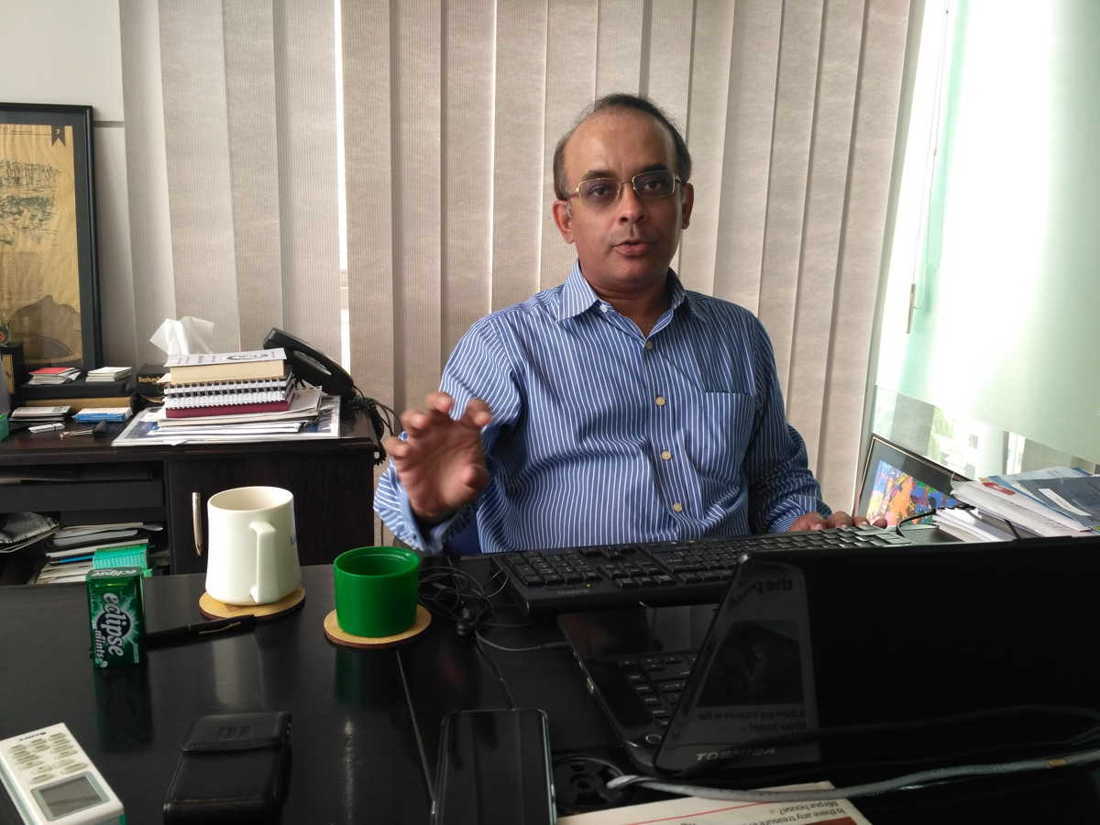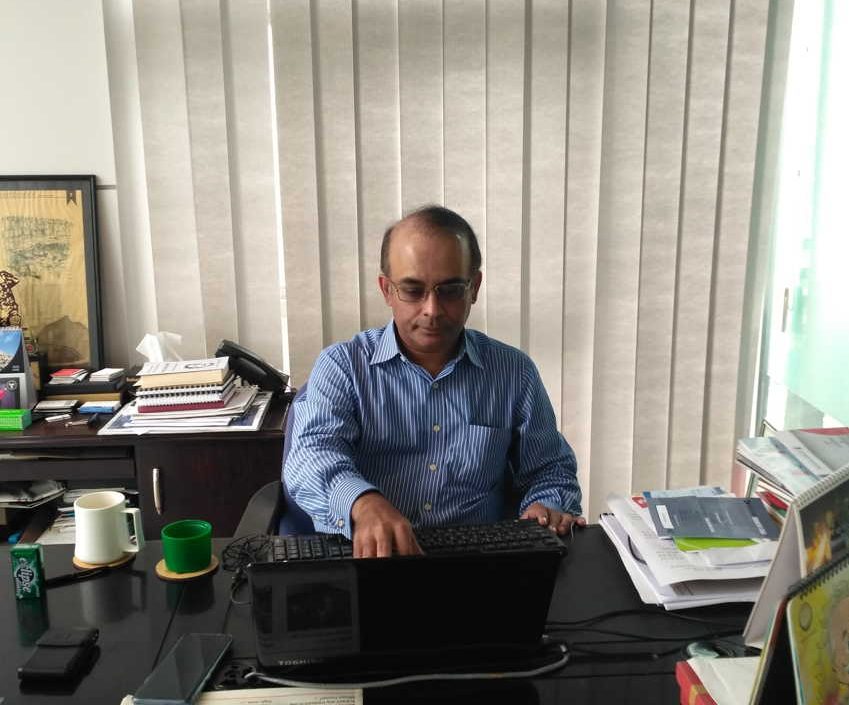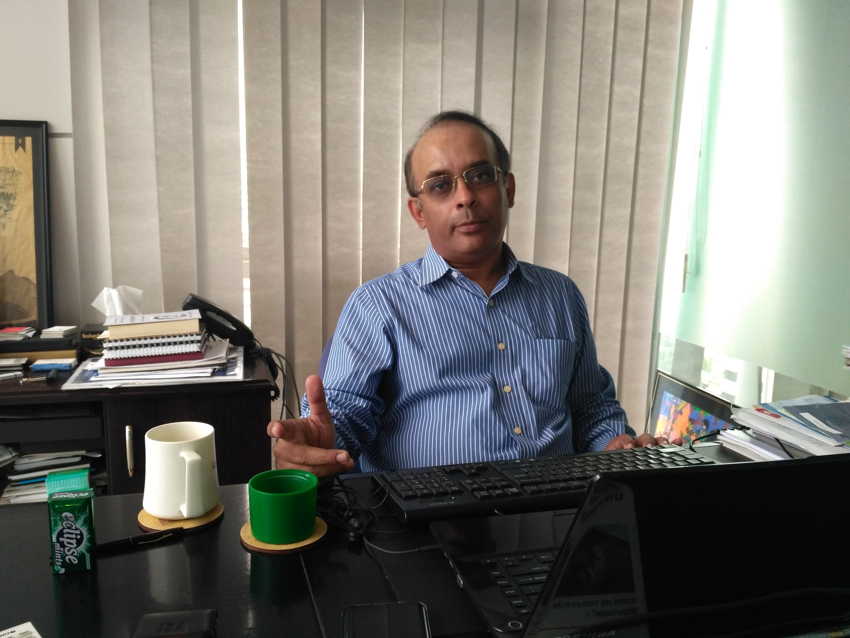
Kazi Food Industries CEO Tanvir Haider Chaudhury on how a connected world and a shift in narrative have changed our society over the years, how values have changed, imperatives for leadership, reading as the best form of intellectual pursuit, why thoughtful action is the antidote to all our challenges in life, why we should be mindful about consuming continuous assault of media on our sanity and how to deal with it, why you must stop giving yourself excuses if you want to get something done, find ways to override all your excuses and still do it and why we should be relentlessly mindful of the fact that we get this (life) one chance to do things and there (in life) is more to life than mere material gains and climbing the corporate ladder.
This was a much longer, so we had to break it down into two parts. This is the second and final part of the interview. You can find the first part here. And also, subscribe to our weekly newsletter to get our stories directly in your inbox.
Future Startup
What are some of the major changes you see in our society today if you compare it with the one you grew up in the 80s and 90s, not essentially in terms of good and bad rather an agnostic observation of the society?
Tanvir Haider Chaudhury
The society has become less diverse. We come across fewer people who are non-Bengali Muslims these days. I come across fewer people from the ethnic groups in my work these days. Before, in our classroom, we had Buddhist, Christian, and Hindu people. Now I hear that there aren't many ethnic/religious minorities in the classrooms. I don't know why this has changed, but diversity has gone down.
The other major change has happened in terms of values. It's not so much that people have become bad when we talk about value degradation. It is so that what is valued in our society has become different.
I think the measure of success has become material possessions. It's natural to do what we have to in order to live a comfortable life. But the definition of a comfortable life and what defines success has changed quite dramatically over the last 10 - 15 years.
With the coming together of the world, internet, and cable television, people know what constitutes as success in other parts of the world. At a certain time, there was a certain respectability awarded to education. If you were a Professor, you would be respected. That was the norm. That’s not the case anymore.
If you're not materialistically successful in a profession, you are not deemed successful.
A person who has achieved a status through power and influence or any other means for that matter is celebrated nowadays. They are the ones deemed successful, regardless of the means they applied to get it.
I think the young have it in them to distinguish right from wrong and tell truth from lies. It's always something that they would be able to do. It is society's failure that you're giving them measures of success that make them desperate. Today, we expect our young people to become millionaires before turning thirty. Zuckerbergs of the world is the ideal that we present to our young people. These are impossible measures. It's a difficult era to be young in.
[su_divider top="no" divider_color="#adacab" link_color="#edde29" size="1"][/su_divider]
It's all about your journey!
Flight Expert is Bangladesh's first online travel agency (OTA). Our goal is to unlock all the facilities of the online travel agency (OTA) so that you, our customers, can easily book flights or hotels online from anywhere without leaving the comfort of your home or office. We believe when our customers win, we win. Hence, putting your needs first is our business. Every day we work hard, seek new ideas and new ways of doing things to make sure that you experience the best trip of your life. You can learn more about us and avail our service here.
[su_divider top="no" divider_color="#adacab" link_color="#edde29" size="1"][/su_divider]
Future Startup
That’s a beautiful way to put it. As you mentioned, the measure of success has changed in our society. Material success has become everything. Today, people who have material success are the philosophers and gurus of our time. This trend is particularly stark among young people. Once young people were very idealistic. Today, it seems things are moving in a different direction which essentially about being successful in material terms, and it does not matter how you achieve it. Do you see this as a matter of worry?
Tanvir Haider Chaudhury
If society dictates that this is your measure of success, then young people are not at fault if they try to measure up to those standards.
The idea that today’s youth are not idealistic or derailed is not true. The recent quota movement puts this whole notion to question: if the young people were not as emphatic as they are thought to be, why would the movement have been so peaceful and void of any tarnishing of public property? It is a just demand and the movement has been one of the peaceful such movements in the recent history in Dhaka.
Young people act on impulse. That's to be expected. Everything is urgent for them. They have no notion of the rest of their lives and they want things now. Which is why young people become revolutionaries and soldiers and poets and writers and change the world. Someone mild doesn't change the world.
I think the young have it in them to distinguish right from wrong and tell truth from lies. It's always something that they would be able to do. It is society's failure that you're giving them measures of success that make them desperate.
Today, we expect our young people to become millionaires before turning thirty. Zuckerbergs of the world is the ideal that we present to our young people. These are impossible measures. It's a difficult era to be young in.
After coming to this industry, I have interacted with many more young people than I used to. By large they are very impressive people. Trying new things. Doing startups. Taking new initiatives.
Most of the fault lies with us older people. The administration and the policy makers for making the society as it is now. The values have not disappeared. Instead, we have been promoting a new set of values. At the same time, the society is making it difficult to live with values.
Take the case of Dhaka city. This is such a mess. We have created a city that is essentially where everything in the country happens. It's a horrible situation.
You can't have a city where the administrative and the commercial capital all here. The banks, executive, judiciary, media, government offices and so many things sit here. It's a failure of planning.
Opportunities have been concentrated in Dhaka. This is not healthy. We can clearly see that it is not helping. The city is falling apart. People inside and outside suffering due to this.
We can still remedy this. The infrastructure that this city has will not able to support everything soon. The city is already overwhelmed. Unbearable traffic and drainage system tell this reality every day.
I’m optimistic about our youth. It’s what we old people do to ensure a better future for our youth what worries me.
The other major change has happened in terms of values. It's not so much that people have become bad when we talk about value degradation. It is so that what is valued in our society has become different. I think the measure of success has become material possessions. It's natural to do what we have to in order to live a comfortable life. But the definition of a comfortable life and what defines success has changed quite dramatically over the last 10 - 15 years.

Future Startup
What does it take to be an effective leader?
Tanvir Haider Chaudhury
The word "leader" automatically constitutes the leader of men or a leader of people. And men meaning the human race. So it basically means that you are able to motivate people.
Taking a page out of Yuval Noah Harari's "Sapiens", he says that the way in which we are different from the other species is that we are able to gossip and able to create myths. The myths might include the religions, the nationalisms, and nationalities, the great companies etc.
People argue about who's superior and they refer to themselves as "We are the best" and so on. People who support a football club say we are the best. Why this "we"? They have nothing in common, so to say. That is because they have created a story and a myth which connects them.
A leader has to be a powerful storyteller, who can create those myths. If you create the myth that Kazi Food Industries is the best place in Bangladesh to work in and if you're an effective storyteller, at some point people will start believing you.
People will buy into your stories and people will recognize the fact that you believe in your stories. Hence, they will trust you.
Future Startup
What are a couple of books you have been reading lately?
Tanvir Haider Chaudhury
I've been reading "A People's History of the United States" by Howard Zinn. This is not traditional history at all since it is told from the perspectives of the Native Americans, slaves and union leaders, leftist etc. who are traditionally taken out of the narratives of the story of America.
I'm looking forward to reading a book of Andrew Feinstein which is about the global arms market, "Shadow World".
I would recommend young people to read "Sapiens" and Christopher Hitchens - who has got this open perspective on so many different things. Interestingly, he's against organized religions which might be an issue with some people but he's a wonderful read and he has strong iron-clad logic for everything he says.
I read Shashi Tharoor's works as well. Recently I have read his "Era of Darkness" which is about the British Rule in India.
If society dictates that this is your measure of success, then young people are not at fault if they try to measure up to those standards. Today, we expect our young people to become millionaires before turning thirty. Zuckerbergs of the world is the ideal that we present to our young people. These are impossible measures. It’s a difficult era to be young in.
Future Startup
What does it take to achieve things - material or otherwise?
Tanvir Haider Chaudhury
The reason why I don't consider myself a writer is because I'm not doing it regularly enough. This is what it takes basically - if you're a writer you write every day, if you're a runner, you run every day.
Achievement demands work. Consistent work.
Do whatever you are supposed to be doing. If you keep at it for long enough time you will become good at it.
Stop giving yourself excuses so that you can keep doing it. "These are the reasons I would not be able to do this" stop giving this excuse.
Look at why you should be able to override all of these excuses and still do it. Many people say I don’t have enough time for this or that. That’s the worst kind of excuse.
If you like doing something, you can always carve out the time for it. Make the changes necessary to accommodate whatever it is that you want to do and put your effort to do it. There is no trick here.
A leader has to be a powerful storyteller, who can create those myths. If you create the myth that Kazi Food Industries is the best place in Bangladesh to work in and if you're an effective storyteller, at some point people will start believing you.

Future Startup
We are probably living in one of the most perplexing time in history. You can feel the anxiety in the air. Add to that, life is challenging and building a business from scratch is more so. How do you stay motivated and deal with stress?
Tanvir Haider Chaudhury
I think that's a myth - the world we are living today is the most peaceful and most stable era in human history. We had lived through eras where multiple nations had embroiled in war situations over many years and we tend to forget this.
We have certain pockets of instability and wars now but in terms of the human experience, things have been better than any time before.
Colored people are having the best experience that they can. Women are having the best experience. Opportunities are more open and people are able to afford meals and a respectable quality of life than ever before.
Life expectancy has jumped from 44 years to 71 years. Objectively it has improved, even if the statistics and parties might argue.
The fact that we are constantly assaulted by the media all the time - social media, news sites etc. - bombarding us with information which is mostly bad. We have this perception that everything is bad.
Compartmentalizing is a way to do this. I take all the pressure from my work-place and leave it somewhere when I go home. I do my own thing there.
Mindfulness and being in the moment are something I have to get better at. Generally, I am in the moment kind of person and that helps but I think I have room for improvements there.
Future Startup
What advice do you have for people who are just starting out?
Tanvir Haider Chaudhury
Find something that you are actually interested in. If you are not inherently interested in something, it's very difficult to succeed at it over the long-term.
Try to be the kind of person who can extract performance out of people who don't report to you. For that, you have to be a good networker and not just knowing all the seniors in the organization. It's knowing your peers, people who are below you in terms of hierarchy and get to know those people because to be an effective corporate person who has to extract performance from you have people buy-in to what you are trying to do. If you can do that, you will see a fast growth in your career.
Lastly, compartmentalize - if you put material success as the top priority of your life, you will damage yourself physically and mentally.
I know people who were in the middle of their careers and died of severe stress. Nothing is worth amount to that ending. We get this one chance to do things and life cannot just be about climbing the corporate ladder.
Stop giving yourself excuses so that you can keep doing it. “These are the reasons I would not be able to do this” stop giving this excuse. Look at why you should be able to override all of these excuses and still do it. Many people say I don’t have enough time for this or that. That’s the worst kind of excuse.
-
Interview by Ruhul Kader, Transcription by Shabiba Benta Habib
Read the first part of the interview with Mr. Tanvir here.
Photo by: Ruhul Kader
